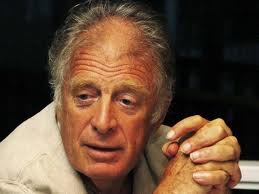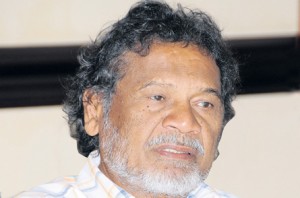BY HOWARD CAMPBELL——

IN August, it will be 50 years since Jamaica gained Independence from Britain. Today, the Jamaica Observer’s Entertainment section reflects on the influence Jamaican pop culture has had on that country in REGGAE BRITANNIA, a weekly feature leading up to the Golden Jubilee.
IN the summer of 1987, music producer Sonny Roberts was savouring the success of Can’t Be With You Tonight, a song by St Vincent-born singer Judy Boucher which went to number two on the British national chart.
  SONNY ROBERTS… producing hits in his studio SONNY ROBERTS… producing hits in his studio |
Among the well-wishers stopping by his London home were old friends Lee Gopthal and Chris Blackwell.
“I remember Chris hugging me and saying, ‘Sonny, after all these years yuh finally get a hit’,” Roberts, now 80, told the Jamaica Observer recently.
Three of the pioneers of Jamaican music in Britain, Roberts, Gopthal and Blackwood once lived on the same complex owned by Gopthal. London-born Blackwell founded Island Records in Jamaica in 1959 while Gopthal, a Jamaican of East Indian descent, started Trojan Records in 1968.
Roberts, who was born in the Manchester district of Spicy Grove, went to London in 1958. Three years later, he established the first recording studio by a Jamaican in Britain and operated the Planetone label which released songs by alto saxophonist Mike Elliott and trombonist Rico Rodriquez.
In the mid-1970s, Roberts launched Orbitone Records, which not only embraced the emerging lovers rock sound, but helped expose the burgeoning Afro Beat through Nigerian saxophonist Peter King and the Nkengas band which was also from that West African country.
Junior Lincoln went to England from west Kingston in 1959 and was involved in the music business there for over 20 years. In an interview with the Observer, he spoke of Roberts’ achievements in Britain.
“Sonny wasn’t mainstream like a lot of the small Jamaican labels until he opened his record store in the 1970s,” Lincoln said. “For me, his greatest contribution was developing the careers of young, black British artists.”
Roberts says the Britain he immigrated to in the late 1950s was “very hard”. In addition to the chilly weather, Caribbean immigrants faced rampant racism and many lived in squalid, low-income houses.

One of the addresses Roberts lived in the early years was 108 Cambridge Road in London, owned by Leichman ‘Lee’ Gopthal, an accountant who settled in England in 1952. A carpenter by trade, Roberts also owned the Love Vendor sound system which played at Jamaican dances throughout London.
He also set up a studio in Gopthal’s basement where he recorded mainly instrumentals by Elliott and Rodriquez.
In their book, Young Gifted and Black: The Story of Trojan Records, Michael de Konigh and Laurence Cane-Honeysett described Roberts’ studio as a “primitive affair with old egg-trays lining the walls to dampen the sound.”
Roberts closed Planetone and his studio in the late 1960s when Jamaican music was targeting the British national chart. He returned to the music business in the 1970s with Orbitone, located in the Harlesden area of London.
The store became a hub for the city’s diverse population who wanted the latest in reggae, world beat and calypso music.
“Everyone came there, not just Caribbean people. You had Irish, Africans …. everyone,” Roberts recalled.
In a decade when protest music was popular, Orbitone showcased reggae’s softer side, releasing albums by Boucher, Joyce Bond and Tim Chandell. The latter’s 1977 album, Loving Moods Of, remains one of the label’s best sellers.

During the 1970s, Roberts befriended several African musicians who lived in London. Among them were King and the Nkengas.
While King’s songs were easy-listening instrumentals, Nkengas’ stripped-down Orbitone albums are some of the earliest examples of Afro Beat music recorded in Britain. Roberts produced those projects at the famous Chalk Farm studio in north London.
By 1997 when he returned permanently to Jamaica, Sonny Roberts had assembled a formidable 57-album catalogue with Orbitone. A cancer survivor, he lives in the St Andrew hills with his family and produces natural colouring and seasoning products.


You must log in to post a comment.